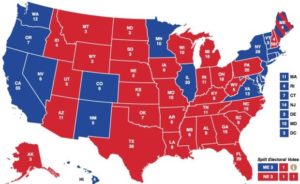 The electoral vote system has long been criticized, and polls show a majority of Americans support reforming the system to ensure the popular vote winner wins the presidency. That consistently happened from 1888 through 1996, then in 2000 and again in 2016, the popular vote losers squeaked into office by scraping out electoral vote majorities.
The electoral vote system has long been criticized, and polls show a majority of Americans support reforming the system to ensure the popular vote winner wins the presidency. That consistently happened from 1888 through 1996, then in 2000 and again in 2016, the popular vote losers squeaked into office by scraping out electoral vote majorities.
The electoral voting system is built into the Constitution, and amending the Constitution is extremely difficult, so reformers began looking for a way to bypass the constitutional amendment process. Building on work by a Yale law professor after the 2000 election, a computer scientist came up with the idea of the National Popular Vote Interstate Compact (NPVIC) in 2006.
The idea is that a group of states controlling at least 270 electoral votes — a majority — would agree among themselves to cast their votes for the winner of the national popular vote, rather than the winner of the popular vote in their individual states, through the vehicle of an interstate compact, an existing type of legal framework. (For example, there are interstate compacts governing rivers flowing through several states.)
There are unresolved legal issues involving the NPVIC, such as its constitutionality, and whether congressional consent is required. For additional background on the NPVIC, and discussion of legal issues, see the Wikipedia article here.
Joining the NPVIC is voluntary, and requires legislation by individual states; so far, 15 states plus D.C., who collectively have 196 electoral votes (leaving 74 to go) have enacted such legislation (including California, Oregon, and Washington). See map above (click to enlarge; NPVIC member states are in blue).
The 2020 election is likely to bring a renewed push. “National Popular Vote, the group pushing the compact, is focusing in 2021 on Virginia and eight other states: Arizona, Arkansas, Maine, Michigan, Minnesota, Nevada, North Carolina and Oklahoma,” the Associated Press reported on Friday, December 11, 2020. Those states, which together have 88 electoral votes, were picked because NPVIC has passed at least one legislative chamber in those states. Read story here.
Supporters hope NPVIC will be enacted in time for the 2024 election, but that’s a longshot at best, and it may never be enacted. In general, the electoral college is thought to favor small rural states and Republican candidates, who can be expected to vigorously oppose changing the existing system. And if it does sign up enough states to reach the 270 threshold, it’s certain to be challenged in court, and nobody knows how that would play out.